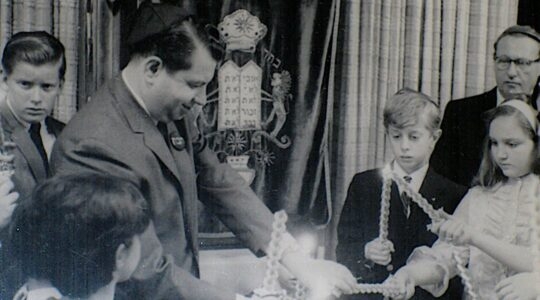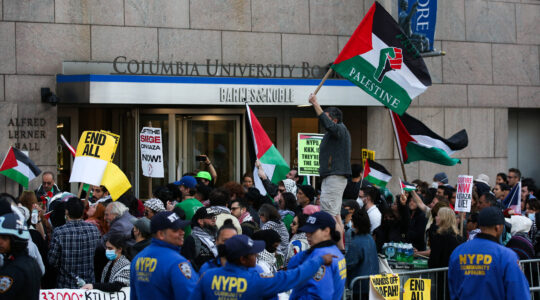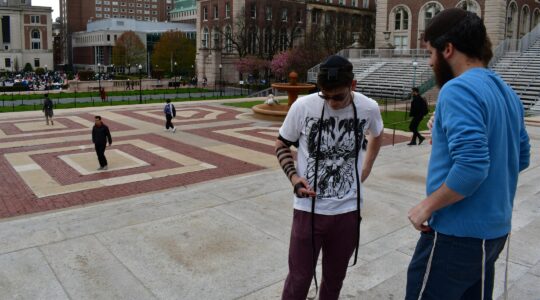I hadn’t seen Nissim, owner of my favorite kosher restaurant in my Queens neighborhood, for a while, but he saw something new on me right away.
“That’s one of those Three Weeks things, right?” he said, pointing to my face with a note of concern. It had sprouted a growth of unkempt, untrimmed beard since I last had sampled his steamed dumplings and egg roll.
“Yes, thank God,” I answered. I hadn’t shaved for nearly two weeks because we were deep into the period known as the Three Weeks, the time ending on Tisha b’Av, Judaism’s second-most stringent fast day. The Three Weeks, which begins with the fast of the 17th day of the month of Tammuz, when the walls of ancient Jerusalem were first breached by Babylonian troops, commemorate the destruction of the two holy Temples.
Left unsaid by us was the contemporary relevance of the Three Weeks. Nissim’s family is Israeli. Many of his customers bear the unmistakable accents of sabras. On all of our minds was what is happening in Israel now, a barrage of Hezbollah missiles in northern Israel and Hamas rockets in the south. All of it, as well as the continuing threat of terrorist bombings in the center of the country, is taking a daily toll on Israelis.
In his synagogue and mine announcements were made about public days of prayer and fast, on behalf of Israel — acts of piety called for by prominent rabbis, in addition to the prayer and fasting of the Three Weeks.
In his restaurant, you could see the concern on customers’ faces — concern that exceeds the pro forma seriousness of the Three Weeks.
In our understanding of Jewish history is the belief that the period preceding Tisha b’Av is not a propitious one for the Jewish people — it is no coincidence that the war in Lebanon escalated during the Three Weeks.
Because of the solemnity of the days between Tammuz 17 and Av 9, specifically because of the fate of the Temples, it is considered a semi-mourning period, with many of the prohibitions of an actual month of mourning in effect. No eating of meat, for instance, during the last nine days of the Three Weeks; at Nissim’s, I was getting my last taste of fleish till after Tisha b’Av. And no listening to live music. No attending movies or theater. No bathing for pleasure. And no haircuts or shaving.
Hence my unseemly beard.
Nissim has a good memory. The last time I had entered his restaurant in such a hirsute manner, about eight months earlier, it was for an actual mourning period. My father had died within the month, and I hadn’t shaved. That’s why I said “thank God” this time. I hadn’t lost anyone. Many men in my religious community looked like I did. Nissim did too.Then a twinge of guilt hit me. It was “only” the Three Weeks, I had cavalierly thought. Of course I was glad that my family had not sustained a loss, but I realized I was not taking to heart the national loss the Jews had suffered, a loss we have remembered in sadness for 2,000 years. In addition to the physical structures where kings ruled and where sacrifices were brought, we had lost our sovereignty, our strength, our unity and thousands of lives. Two millennia of exile followed the second fall.By all standards it was a national tragedy.
But Tisha b’Av, which was marked this week, which has come to include memorializing of such subsequent black eras as the Holocaust, which is largely unknown to and unobserved by many Jews, is a hard holiday for modern Jews, even Orthodox ones like me, to get their spiritual arms around. How do we make this day of remembrance and the whole Three Weeks period relevant in modern times? Why do we keep mourning? I asked a rabbi friend this several years ago. Think of the most powerful spiritual experience you have ever had, he suggested, and magnify that a thousand-fold. I do that each year. I imagine transcendent events in my Jewish life that keep inspiring me. It helps – but not enough.
Ironically, the beard helps. It’s uncomfortable. It’s itchy. It’s messy. But it’s supposed to be. It’s supposed to bother me. Every time I look in the mirror, every time I unconsciously scratch it, it’s a reminder. And it’s a connection to other Jews who have grown Three Week beards and taken on the other stringencies of the period for generations before me.
Support the New York Jewish Week
Our nonprofit newsroom depends on readers like you. Make a donation now to support independent Jewish journalism in New York.
The story is told that when Napoleon was traveling through Paris, he passed a synagogue, where he heard the sounds of loud and heart-rending crying. He was told that that day was Tisha b’Av, that the congregants were fasting and sitting on the floor, weeping and reading Lamentations, for events that had happened hundreds of years before.
According to the story, Napoleon declared that any people with such a strong historical memory would survive and return to their land.
Maybe the story is apocryphal. Maybe I can’t approach the zeal of its lachrymose Jews. But I understand the story’s moral.This year I understand more than ever.
I don’t cry for the lost Temples. But for Three Weeks I don’t shave either. After Tisha b’Av I thankfully shaved off my beard, thankful that this time my mourning period ended after Three Weeks, not after 30 days. And I prayed that Jerusalem would not fall again.




